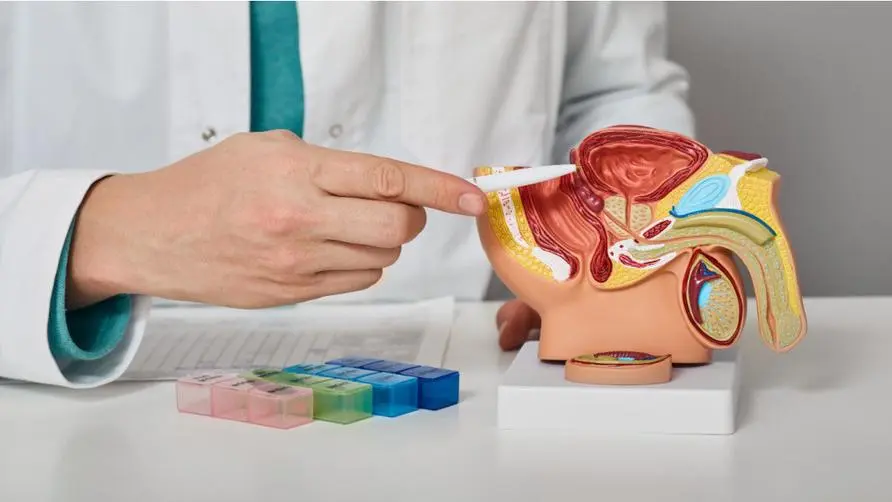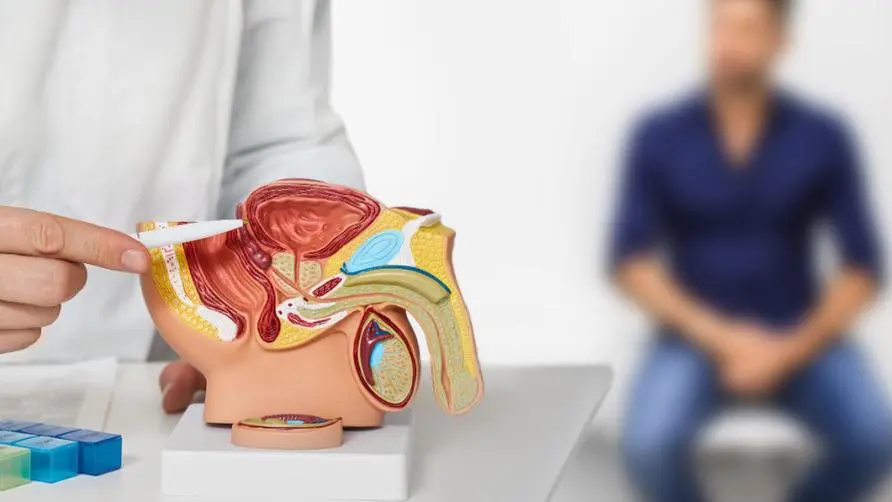I would rather "wear diapers" than seek medical treatment! 60% of prostate cancer diagnoses are in the advanced stage. Doctors urge men to undergo "2 check-ups" every six months

The father of a socialite and the Taiwanese chess champion both passed away because of “it”! Prostate cancer is the “silent killer” of men
Many people think that prostate cancer is not fatal, but this is not the case. The father of socialite Sun Yunyun, Sun Daocun, and Taiwanese chess champion Wu Guilin, etc. died of prostate cancer. Dr. Feng Sizhong, chairman of the Taiwan Urological Medical Association, pointed out that the incidence and mortality of prostate cancer are increasing year by year in Taiwan, and it now ranks fifth and sixth among male cancers respectively. Although the five-year survival rate of patients detected early is close to 100%, if metastasis occurs, the five-year survival rate is less than 42%. The high mortality rate can be called the “silent killer” of men.
A 75-year-old retired man has had urinary abnormalities for many years but has been reluctant to seek medical examination. It was not until he suffered unbearable bone pain four years ago that he sought help from a doctor. At that time, the PSA index was measured to be as high as 280 ng/mL. Further examination was confirmed to be prostate cancer, which had metastasized to 3-4 bones and lymph glands. One year after traditional hormonal therapy and surgical resection, the disease still recurred. Even after half a year of traditional hormonal therapy and next-generation hormonal therapy, the growth of cancer cells could not be suppressed. Fortunately, after adding “PARP inhibitor” treatment, the tumor shrank and the symptoms improved, and there are currently no other side effects.
I would rather wear diapers than seek medical examination! 60% of prostate cancer patients are diagnosed at an advanced stage
According to statistics on causes of death in Taiwan in 2022 released by the Statistics Office of the Ministry of Health and Welfare, the number of deaths from prostate cancer in 2022 will be 1,830, and the mortality rate has increased by 47.5% in 10 years. It is one of the main causes of death for people over 65 years old and has a great impact on life. Threatness increases with age. Most men, considering their self-esteem, would rather wear adult diapers than go to the urology department for examination. In addition, there is insufficient publicity in health education in Taiwan and screening tests are not as popular as other cancers. As a result, male prostate cancer in Taiwan is more malignant than in Western countries.
Dr. Ou Yanquan, director of the R&D Innovation Center of Children’s General Hospital, said that most of the early stages of prostate cancer have no signs or symptoms are non-specific. In addition to being easily confused with the symptoms of benign prostate hypertrophy, which usually occurs between the ages of 50 and 60, Taiwanese There is also not enough vigilance about prostate cancer, and patients often ignore warning signs. As a result, nearly 60% of Taiwanese patients are diagnosed at an advanced stage, and more than 30% of patients have metastatic lesions when they are first diagnosed.
Dr. Ou Yanquan further added that the most common metastasis site of prostate cancer is bone, accounting for about 75%, followed by metastasis to internal organs or lymph glands, which accounts for about 15%, and bone metastasis combined with internal organ metastasis 10%. The outpatient clinic has observed that some patients go to orthopedics or other surgeries first, thus missing the best opportunity for treatment. Once the Gleason score of metastatic prostate cancer patients reaches 8 or above or the PSA index is >20 ng/ml, their disease will The process is more aggressive and the probability of deterioration in the future is also higher.
Risk factors for prostate cancer include, in addition to age 60-80, men with a family history of prostate cancer, those with mutated genes such as BRCA, those who take male hormones, or those who eat more high-fat foods. High risk group for prostate cancer.
PARP inhibitor treatment is fully launched to provide better options for prostate cancer patients
Although there are many treatment options for metastatic prostate cancer, different treatment strategies affect subsequent disease progression and patient survival. According to standard treatment guidelines, the initial clinical treatment is ablation therapy (ADT), which uses drugs or surgery to reduce the concentration of male hormones in the body as much as possible. However, cancer cells usually develop resistance after 1 to 3 years of treatment. When patients Those whose serum testosterone concentration is as low as the castration standard (<50ng/dL) but whose cancer cells continue to grow will enter “metastatic castration-resistant prostate cancer”, which is not only difficult to treat, but also has a rapid and high mortality rate. There is an urgent need for better clinical treatment options.
Dr. Huang Yixiu, director of the Department of Male Reproduction at the Department of Urology, Taipei Veterans General Hospital, explained that the targeted drug PARP inhibitor blocks the DNA repair mechanism of cancer cells by inhibiting the activity of the polymerase PARP, thereby causing cancer cell apoptosis. Clinical study results show that PARP inhibitors alone can effectively prolong disease progression-free survival for patients with BRCA mutation genes, which is three times longer than the new generation of hormonal therapy.
If used in combination with a new generation of hormonal therapy, it can be used for patients with metastatic castration-resistant prostate cancer regardless of genotype, and compared with the new generation of hormonal therapy, the radiographic progression-free survival can be increased by 8 to 11 months. Monthly, the risk of disease progression or death is also reduced by more than 30%6. In addition, whether used alone or in combination, PARP inhibitors can shrink tumors, lower PSA index, and allow patients to maintain a better quality of life.
Prostate cancer in Taiwan is highly malignant. Regular “2 check-ups” can help prevent the disease from getting worse.
Dr. Huang Yixiu also shared that a tour guide who was over 70 years old had no abnormal urination and was in good health. It was not until the first physical examination four years ago that the PSA index was abnormally high, so he went to the urology department for medical examination. At that time, he was diagnosed with metastatic care. For adenocarcinoma, the tour guide still observed that the disease continued to worsen after receiving castration therapy, new generation hormone therapy and chemotherapy. Since the genetic test results showed that he had a BRCA mutated gene, a single PARP inhibitor treatment was arranged for him.
Although there was slight anemia in the early stage, fortunately, the symptoms improved after the blood transfusion. In addition to the decrease in PSA index after half a year of treatment, no other serious side effects were observed. Dr. Huang Yixiu said he was pleased that PARP inhibitors can achieve such good therapeutic effects on patients with advanced disease. He also explained that considering the uncertainty of future disease development, he would still recommend patients to undergo genetic testing first.
Dr. Huang Yixiu pointed out that patients with BRCA mutation genes can receive PARP inhibitor treatment alone. In addition to having fewer side effects, it can also reduce the financial burden of patients. Dr. Ou Yanquan also emphasized that men over 50 years old should go to the urology department for blood prostate-specific antigen (PSA) tests and digital anal examination every six months. If they are highly suspicious, it is recommended to undergo multi-parameter magnetic resonance imaging fusion ultrasound. Imaging slices, early detection and early treatment are the way to peacefully coexist with prostate cancer.
Further reading:





